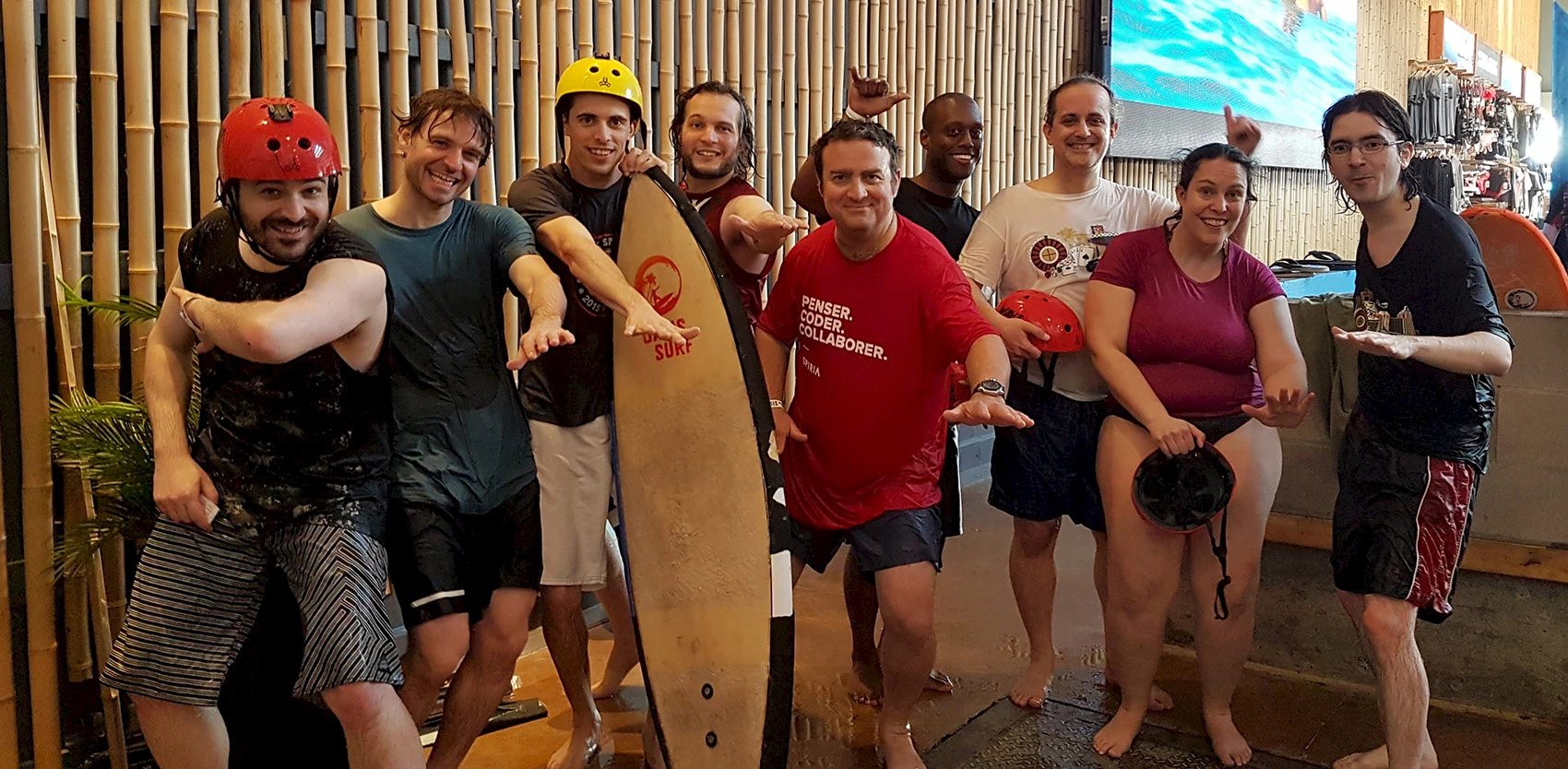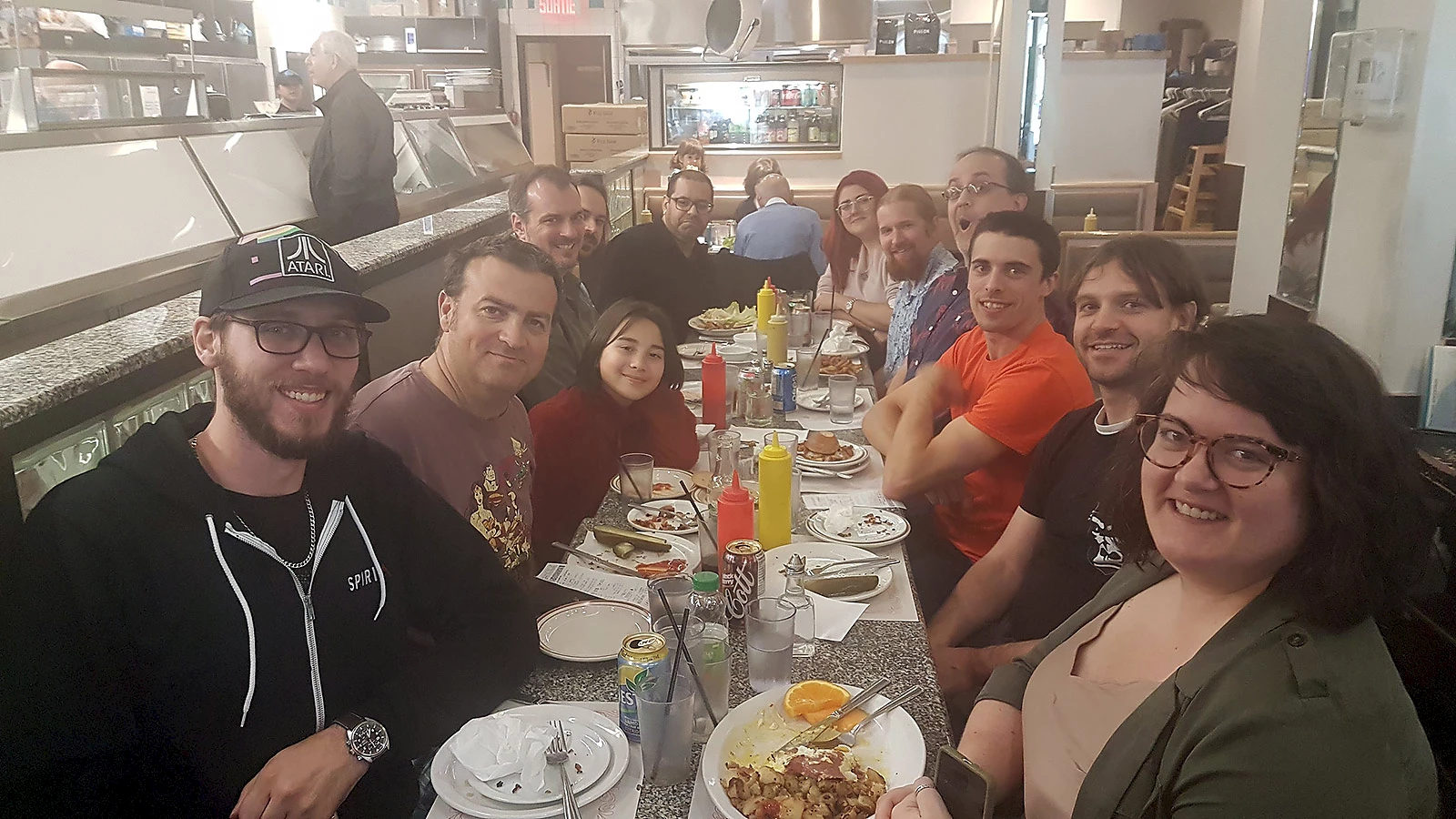Taking Fun Seriously

Don Ramsey, Director of Post-Production at Spiria, is a big believer in team activities outside the office. He takes fun very seriously and is always organizing fun activities with his team. Here, he shares his experience with us.
Watching how people behave when they don’t have to do something, where they will not be fired if they don’t do it, shows people’s true character. It’s sort of like the difference between how a person behaves alone versus when they are with other people.
Bonding with your teammates may sound corny, but actually, the more you see others in different scenarios and unusual situations, the better you get to know them, the better you can predict their behavior and, in turn, the more you can rely on them. It’s hard to know people’s limits, quirks, or hidden qualities just by watching them in meetings, sitting in front of computers all day, or even hanging around the cafeteria.
It’s much better to do fun things away from your workplace. When you do a fun activity in the office, you still subconsciously observe your assigned hierarchy and roles. At the workplace, you never know when your boss might suddenly halt the activity and ask you to jump to a work task as per the role you are paid good money to perform. But even if, in all probability, your boss is not going to divert you, you always remain an employee of the company within those walls. Conversely, if you are a manager participating in or organizing a fun activity, you must be truly prepared to stop bossing during fun time and just be an average Joe. I was impressed (brown nose warning!) by our great, omnificent President, who dropped by Mont-Tremblant to support a 24-hour ski marathon organized by a colleague and that some of us were participating in; he even carried my skis for me! I almost tipped him, but I’m cheap. The following year, he was just another one of us minions in the actual ski relay, sleeping on the living-room floor in a cramped condo between shifts (yup, I got a great “Sleeping with the boss” picture!).

What kind of activities should you look for? In previous companies, I participated in mandatory events involving people incanting company values at ear-splitting volumes in a sports field, but that’s not quite what we’re looking for here. The easiest activity, of course, is to just go out and eat, since everybody needs to eat. But when you eat is also important: supper allows for a much more fun dynamic because people can really wind down, whereas rushed lunches bookended by work are stiffer… and more sober. But other than discovering your colleagues’ odd eating habits or possible lack of table manners (burp!), pure dining activities are not that thrilling in and of themselves. Generally speaking, the physically further and more different you can get from your workplace routine, the better. When you see movies about war veterans remaining such good buddies later on in life, it’s not just a cliché. People simply trust each other more when they have survived extreme experiences together. Not that I recommend war as a fun activity, but short, intense physical or team experiences like the 24-hour Mont-Tremblant ski relay marathon, indoor surfing, axe-throwing, day or night skiing, or a weekend group getaway can be fun. A tech company I used to work for in Taiwan believed in group bonding getaways so much that they partially subsidized any group of 3 or more colleagues going on any trip anywhere together. What you will discover about people on these adventures can be eye-opening: you might find that the shy guy on your team is actually quite a rugged, resourceful and easy-going dude who has no problem volunteering to sleep in a tent outside in cold weather. That a relatively unhealthy colleague is actually a really good sport about being nudged to catch up and never complains about anything. Or that someone who is usually quite cheerful in the office can sulk for extended periods. Or, while sitting on multiple chairlift rides with someone who didn’t always make sense to you at work, you may find that the person is actually quite cool and down to earth after all. You might observe patterns of “overpromise and underdeliver”; you might more clearly see who the natural leaders in your group are — the ones who have solid ideas, pick up the slack for others in order to meet common goals, listen intently, are easy-going, not vindictive, set a good personal example, look for reasonable consensus, and who others will gravitate to for counsel.

Of course, the bigger the group, the harder it is to organize something that everybody wants to do, and can do, on the same day. You can use the wonderful Doodle app to democratically narrow down date and activity options, but you still might not get everyone in sync. That is a reality you’ll have to accept, and you’ll have to try to prioritize the missing folks in the next activity. Is the fact some employees have mates, spouses or children an excuse to give up? No way. Bring ’em along… you will just have to be more creative in planning.
How people engage in the planning and logistics of a fun event is also a fascinating lesson in character. Some proactively volunteer to think of contingencies and help make sure the planning will be successful, while others are more passive, last-minute, or ultimately not even ready to participate. But sometimes, how people do not participate in an activity is as telling as how they do participate. Not joining a voluntary, fun activity is not a crime, because it’s just that: fun and voluntary. But once you’re committed, other people start depending on your delivery — whether it’s to deposit the necessary funds, prepare food on a certain day, or be a member of a team event. Unexpected stuff happens and plans must change sometimes; but the timing, clarity, and sincerity with which other dependent teammates are notified (or not) of your inability to meet a commitment for something that is not directly job-related speaks volumes, for better or for worse, about trustworthiness and thoughtfulness.

Why go through so much trouble? Should you even be trying to have fun in a non-work setting with your employees? Doesn’t ‘familiarity breed contempt’? In fact, familiarity breeds understanding and respect in both directions. Even in a technical company like Spiria, if your hires don’t have patently good character and judgment to begin with, then their other skills are irrelevant. And if they have a decent character, why wouldn’t you want to be their friend… even if not their BFF? Is it because you fear that if they win all your money at poker (the sneaky little bastards!) or shoot or surf or ski better than you, they will stop respecting you at the office? If you actually fear that being “unmasked” and showing all your good, silly, and ugly sides is going to affect your ability to lead in the workplace, then you have much larger personal and people management issues to deal with. The benefits of you and your employees really getting to know and understand each other far outweigh the very intense sadness and unpleasantness of possible terminations or disciplinary procedures later. Knowing what really makes people tick is never a bad thing. Taking fun seriously helps you to know what to expect from the people you work with, which makes all the serious stuff more fun, too.
